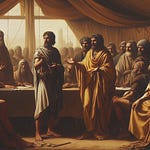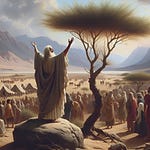Chapter Summary
Have you ever sensed God pushing you do something that was outside your comfort zone?
In Exodus 4, Moses is going through that experience, as God brings Moses to a place of surrender.
Commentary
vv. 1–9 - As the interaction between God and Moses continues, Moses appears doubtful of a positive response from the children of Israel. If he didn’t comprehend the depravity of human nature at 40, he certainly understood it at 80. God condescends to give Moses miraculous evidences to affirm his prophetic status. The rod is turned into a serpent and back again. I do not think this had anything to do with the Egyptian gods Apophis or Wadjet. The signs given were specifically for the Hebrew elders. Thus, the serpent, leprosy, and the water turned to blood, possibly have redemptive significance. The three represent the symbol of Satan as a serpent, sin in the leprosy, and salvation by the blood. Alternatively, Christ is spoken of as “the rod of God’s strength” and in His condescension, He was thrown on the ground to take the curse upon the world. In addition, like the leprous hand, Christ became sin for us. These redemptive signs are followed with a sign only to be shown if the previous are rejected. It therefore signifies judgment for unbelief.
vv. 10–17 - Moses expresses his fourth objection; his slowness of speech. God tells him of His sovereignty over such details. Then Moses objects for a fifth time in v. 13, suggesting that God send anyone else but him. This is no longer humility, but an expression of a wicked and sinful opposition to God’s will. God graciously condescends to supply his brother Aaron.
vv. 18–23 - Moses returns home and gets approval from Jethro to leave. Perhaps he delays for a time, because God then tells Moses to go since all his known enemies were dead. Taking his wife and sons, God informs Moses that he should not expect immediate success because Pharaoh will need to be threatened before he lets the Hebrews go.
vv. 24–26 - in these challenging verses, context regarding the killing the firstborn may be key. I do not think God came to kill Moses—as some read it—but his firstborn, Gershom, because he was not circumcised. Moses, upon marrying Zipporah, either neglected or was dissuaded from circumcising Gershom. This experience illustrated the importance of household obedience. The Passover will threaten the death of the firstborn, and the only way to escape judgment was to sprinkle blood on the doorframe and make sure all males were circumcised. Zipporah moves in fear for her son’s life and circumcises him. Was Moses again hesitant to obey God to circumcise his grown son? We do not know. But his wife steps in and appears to throw the removed flesh at Moses, although, looking at the Hebrew, it may not actually have been at his feet.
vv. 27–31 - Aaron and Moses join and go before the elders of the children of Israel. Aaron, under Moses’ direction, speaks and performs the signs, leading them to believe and worship God together. Aaron, depicting men as co-laborers with God in the company with his mediator, must meet with Christ before he engages in service for God.
Application
God gives second chances after a period of pruning. In chapter two, Moses ran ahead of God in seeking to deliver the Hebrews, and that disappointment exhausted any sense of enthusiasm for the future. But God is now commissioning him, giving Moses a second chance. If you have failed, neither despair to think that God will never use you again, or act too hastily in getting to where you would like to go. Transformation happens in the throes of brokenness. Do not rush from the place of pain. Let God work in your life and ask Him to open the door at the right time.
Timidity is sinful when it turns aside from duty. While pride and self-confidence is rightly condemned by believers, sinful timidity is too often excused, overlooked, and falsely perceived as pious. But the anger of Almighty God is kindled against Moses for this very attitude. God resents anything that stifles our obedience to His Word. It is impossible to possess a true evangelical faith without a form of courage which obeys God at all times. Do not focus on being courageous, but if you have faith to obey God, courage is inevitable. Learn to discern the unbelief in your timidity in doing God’s will and trust Him as you did when you asked Him to save you.
God can harden the heart of the rebellious. We are going to read more of the hardening of Pharaoh’s heart. Here are a few things to remember. First, God does this not to those who love Him, but to those, according to Romans 1:28, do not “like to retain God in their knowledge.” The hardening is not the origin of the rebellion, human nature is. Second, this hardening does not happen in a vacuum, but when men are faced with the truth and refuse to submit to it. You see this in 2 Thessalonians 2, where God sends a strong delusion because men receive not the love of the truth. Third, God is not passive in this hardening. In Psalm 105:25, the history given is that God turned the heart of the Egyptians to hate His people. Perhaps we struggle to explain this. Does this struggle permit us to deny it? If God is an active agent in changing men’s hearts, how can He not be an active agent when we are told He hardens men’s hearts? Without ever being the author of sin, God may make the hearts of men more resistant to the truth. This is sobering, and Pharaoh stands as a warning to those who lightly esteem God’s Word.
God’s guidance does not nullify obligations to superiors. Often when someone feels led by God into a relationship, job, or form of Christian service, they do what they want with little contact with their superiors. They may inform them, but they do not seek their blessing. Moses just had a direct encounter with God, and yet he still requests from Jethro to be released from his responsibilities to pursue God’s will. Young person, the humility necessary to place your future into the hands of superiors and have their approval before pursuing a course of action is remarkably confirming. Without it, you’re just a rogue and a maverick with no credible confirmation that you are doing what God wants you to do. You might think this is walking by faith, but it is actually unbelief, since you do not believe God will control the hearts of men to confirm your inclinations. Learn from Moses by seeking approval from superiors.
God is the Father of His people. I had never noticed this before and I have never heard it mentioned, but I think this passage contains the first reference where we can clearly see God revealing Himself as the Father of His people, as he designates Israel as His firstborn. There are few words which bring more comfort to sinners than being able to say “Our Father.” What condescension, that God would adopt sinners. This revelation comes just as God is about to give one of the most powerful representations of His delivering grace in the exodus, and Israel’s right to call God their Father will be based on the shed blood of the lamb which brings them out of bondage and eventually into the promised land. Children, all of us are born children of wrath, and we only become children of God when we obey Jesus and ask Him to save us from our sins. Make sure, if you have not done that, you do so today.
“He may employ an instrument that is apparently as little adapted for the work as Moses felt himself to be. Yet, the work is done, and to God, belongs the honor of accomplishing it.” — Charles Spurgeon











